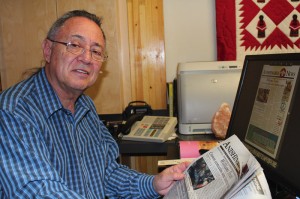It’s not just cows that are stupid
There’s a fairly large consensus that cows are stupid.
This is the normal reaction of anyone who has tried to use a car horn to get the attention of a group of them blocking a roadway. They look right at you with a dazed kind of Stephen Harper look, casually chew on their cuds, and make no attempt to get out of your intended path.
In researching the subject, one learns that a 2005 study proved that cows are moody, feel pain, anxiety, and fear, and are intensely sexual. But no word yet on their I.Q.
My opinion about bovine intelligence was bolstered during a visit to my favourite hardware store, when I passed a display labelled “Cow Magnets”. A clerk informed me that cows are not fussy about what they eat, and the mouthfuls of hay they swallow sometimes contain staples, nails, bits of barbed wire and other assorted metal tidbits. Farmers give them three-inch-long magnetic rods to swallow, which remain in the first compartment of the animal’s four-part stomach, attracting sharp pieces of metal and preventing them from damaging the stomach lining.
Otherwise, my computer tells me, “Hardware disease” can result in lower milk production or lower weight gain.
The real point is not just that cows are stupid – even moreso than I had ever imagined – but that we’re never too old to learn new things. Someone once said that we don’t stop learning when we get old; we get old when we stop learning.
It’s tough dealing with people who have closed their minds to not just new ideas, but to any that are different from their own. First Nations encounter a lot of this when interacting with their Canadian neighbours, many of whom do not want to be confused by the facts.
One such lady – a certain Ms. Smith – recently copied me on her terse letter to the editor of the North Bay Nugget about the eastern Ontario Algonquin Land Claim. You could almost see the steam rising from her scathing attack on “…over-zealous politicians going beyond legal entitlement in settling land claims. They offend the rule of law and the Constitution because they are conferring land and other benefits that are rightfully the entitlement of all Canadians.”
Her opinions seemed to be entirely based on a 1995 book called “Our Home OR Native Land,” authored by the late Melvin H. Smith, a 31-year civil servant in British Columbia. Mr. Smith rubbed shoulders with such political luminaries as Preston Manning and other stalwarts of the former Reform Party, which tells you everything you need to know about his book, and his notions about just resolution of treaties and land claims. Reformers – who have now transformed themselves into Harpies – would prefer that First Nations be offered the first available plots on the surface of the Moon.
At least my correspondent had read one book, which might be more than you can say for many of the experts on Indian Affairs I run across, like the responder to a public opinion poll who said the difference between Aboriginal and First Nations people is that Aboriginal people are darker!
I invited Ms. Smith to join us Oct. 7 to commemorate the 250th anniversary of the issuing of the Royal Proclamation by the Crown in Canada, without which, I mentioned, her ancestors would not have been granted the privilege of settling in this territory by my ancestors. Needless to say, I am not holding my breath waiting for her response. Bolstered by the late Mr. Smith’s book, her mind is closed on the topic.
It is not only private citizens who either have never learned, or do not want to be more knowledgable about the true nature of Canada’s relationship with First Peoples. The Harpy government purports to symbolize the rule of law in this country, and has unleashed a barrage of legislation that contradicts the Constitution Act, Supreme Court decisions, and the United Nations Declaration on the Rights of Indigenous Peoples – all of which they are sworn to uphold.
And media reports – the source of information about Aboriginal issues for most Canadians – are equally ill-informed, if not downright biased. A recent three-year study by Journalists for Human Rights echoed similar analysis dating back to the Report of the Royal Commission on Aboriginal Peoples: journalists don’t report very often on Native topics, and when they do it usually casts their subjects in a negative light.
I’m afraid it is not just cows that are stupid. If only there were magnets that could be injected into our skulls to vacuum up ignorant thoughts and keep them from infecting the rest of our brain.
Maurice Switzer is a citizen of the Mississaugas of Alderville First Nation. He is director of communications for the Union of Ontario Indians and editor of the Anishinabek News.


